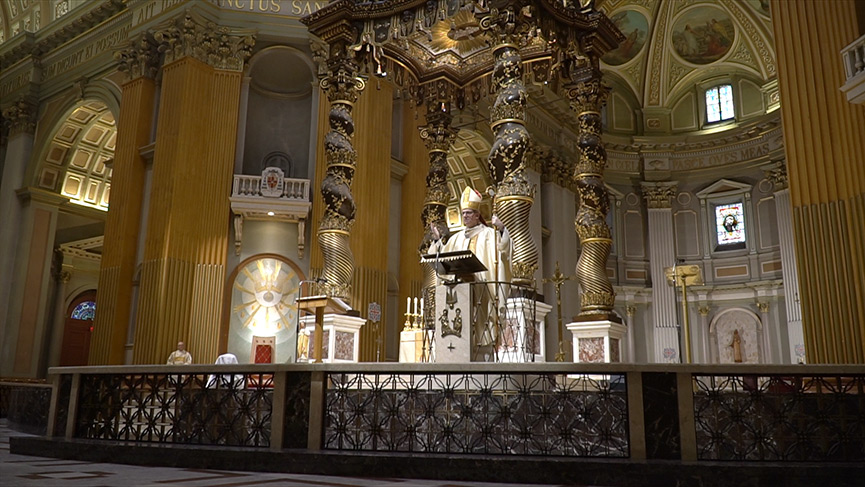Eucharist amid the Skyscrapers

Montreal
Archbishop Christian Lépine of the Diocese of Montreal celebrated a Mass on Thursday, June 3, on the Feast of Corpus Christi. In spite of sanitary restrictions, and although the traditional procession with the Blessed Sacrament could not take place, a small congregation was able to attend and spend a moment in adoration at the end of the Mass.
Through a meditation on the texts of the day, the Archbishop explained the evolution of the meaning of "sacrifice," helping us to understand how the relationship between God and humanity has been transformed over the ages, until today we worship him in the Eucharist.
The meaning of "sacrifice:" from earth to Heaven
First, in the Old Testament, the sign of the blood of the covenant speaks to us of the relationship of the human being to the divine. As the Archbishop explains, "The human being exists, has his or her life, a family, a clan; they are nourished by the products of the soil and the animals, they look at the sky and see the sun by day and the stars by night. And they see that they live under the gaze of God or the deities.’’ And so now, "the human lives before God, in the presence of God. Their faith is based on what they see. It is formed by what they interpret to be deities." Thus, the human being asks for God’s good favour "in order to win wars, in order to feed on the fruits of the earth and the animals." Throughout all such activities, "the human wants to thank God when he or she experiences God’s good favour [...]. They want to give thanks to God."
"In the nobility of their hearts, they see God’s gifts, they see that they receive life and nourishment, and as they are conscious of these gifts of God, they want to give thanks," says the Archbishop.
In religious language, the ‘classic’ term for ‘‘giving thanks to God" is sacrifice: "Because to sacrifice is to make sacred, to take something from the earth and offer it to God." This is why, in the Old Testament, men and women offer a portion of the crops and livestock, placing them on the altar and burning them to make an offering to God in thanks: "Humans offer up something from the earth to God [...]. This impulse is remarkable, of seeing what I receive from God and wanting to thank Him in return,’’ he observes.
The blood of the covenant, God seeking us
A little later on in the story, we meet Abraham. "God speaks to him, and Abraham discovers that even before he had set out to seek God, God was looking for him. This is a revolution! He discovers that God wants to establish a covenant, that God is already committed. The Archbishop goes on to discuss this radical transformation of the relationship with the divine: "God is not just watching me as I seek Him. No, God is there, coming in search of me." This is how "the word Covenant" comes into the story and how we evolve "from religion to the Covenant," he explains, making reference to the story of Moses and the Commandments. This covenant incorporates the concept of God's commitment to humanity and humanity’s commitment to God.
Offering oneself to God
On this Feast of Corpus Christi, the Archbishop concluded his meditation noting the great transformation brought about by the appearance of Jesus as Son of God, who came to tell the world, by means of his life and his cross, that there is no longer any sacrifice to be made to God. And "Jesus is still the gift of God, still saying 'Let me give thanks to God by offering myself to God.' The sacrifice has become offering oneself and one's life, and in this sense there is no longer any sacrifice to be made.’’
Bread of Life amid the skyscrapers
At the end of this Eucharistic celebration, in accordance with tradition, the Blessed Sacrament was exposed. And, carrying the monstrance, Archbishop Lépine went outside to bless the city of Montreal from the square of Mary Queen of the World Cathedral. Even amid the skyscrapers, the humbleness of this God made Bread shines forth as a sign of his Love and his Covenant with us, his people.

Comment
Comment
Add new comment